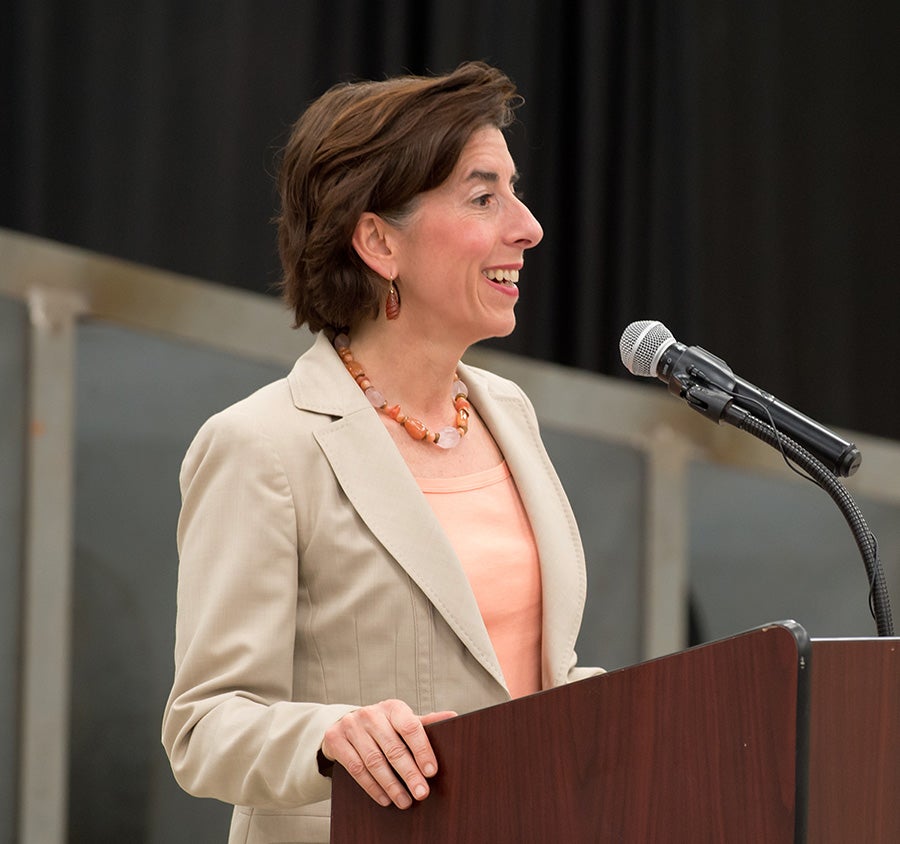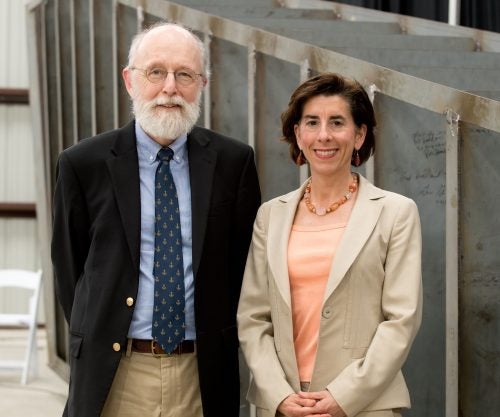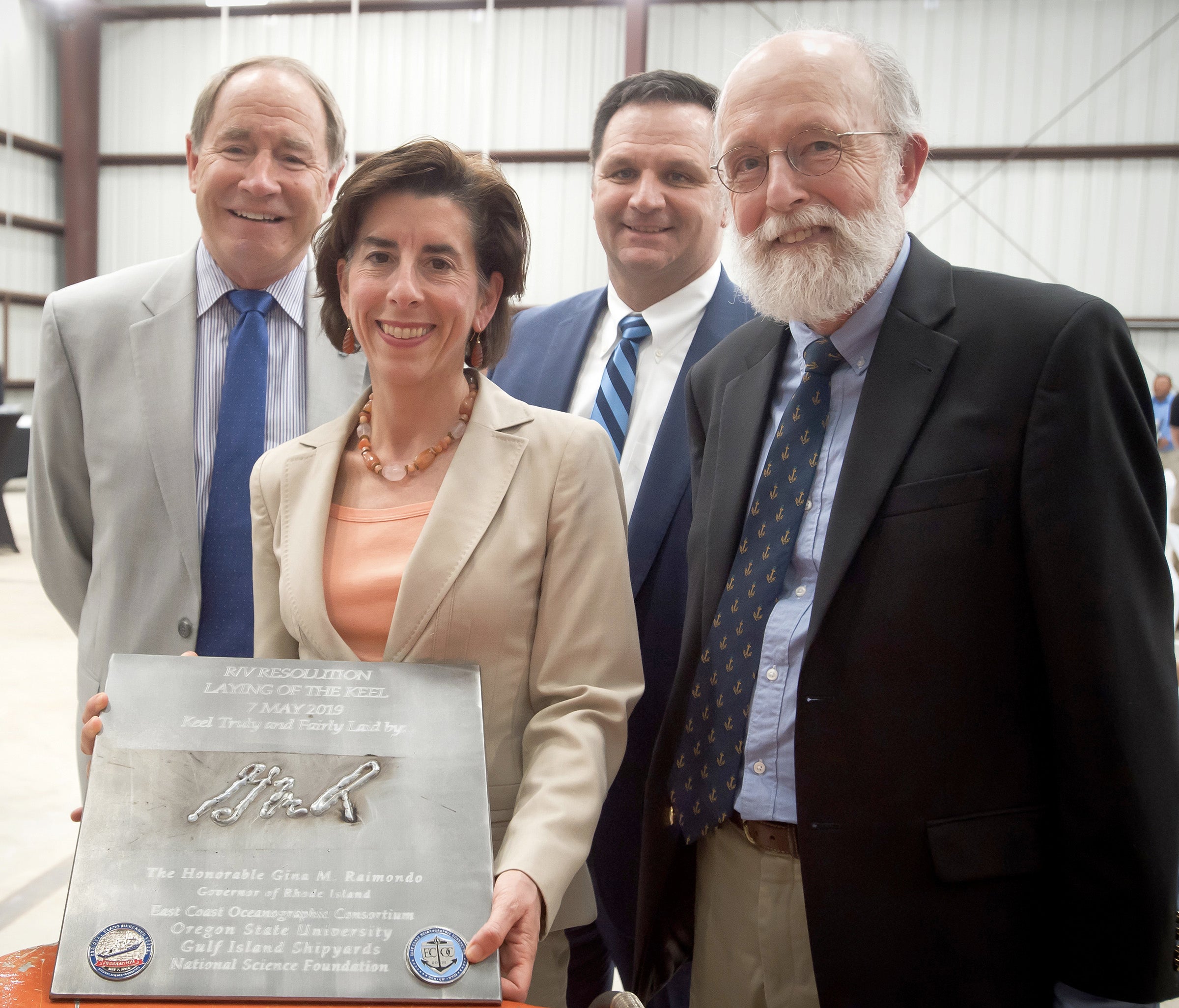HOUMA, LA., — May 8, 2019 — Construction officially began yesterday in Houma, Louisiana on R/V Resolution, a new research ship bound for the University of Rhode Island that will support oceanographic research, such as the tracking of ocean currents, ocean-atmosphere interactions, climate-induced changes in the oceans, fish migration, seafloor surveys, conservation of marine mammals and the food-web dynamics in the deep ocean.
Operated by the East Coast Oceanographic Consortium (ECOC), Resolution will be the second in a series of Regional Class Research Vessels (RCRV) funded by the National Science Foundation (NSF). The Governor of Rhode Island, Gina M. Raimondo, joined officials from NSF, URI, ECOC and Gulf Island Shipyards, LLC for the keel-laying ceremony, marking the start of fabrication of this state-of-the-art ship.
During the ceremony, Governor Raimondo, the ship’s ceremonial sponsor, inscribed her initials into the ship’s keel.
“As the climate continues to change worldwide, it is more important than ever before that we have a deep, thorough understanding of our oceans,” said Governor Raimondo. “With the arrival of the R/V Resolution, the University of Rhode Island will continue to lead the way in oceanographic research, making our state a hub for scientific talent from across the globe and preparing our students for the jobs of tomorrow. I’m honored to be part of this keel laying, and I’m already excited to see the Resolution in Narragansett Bay in 2022.”

With the arrival of the R/V Resolution, the University of Rhode Island will continue to lead the way in oceanographic research, making our state a hub for scientific talent from across the globe and preparing our students for the jobs of tomorrow.
Rhode Island Governor, Gina Raimondo
“Today’s ceremony marks the start of a new chapter in the rich history of oceanographic research and education at the University of Rhode Island,” said URI President David M. Dooley. “The R/V Resolution will play a central role in building on that important research legacy and in enhancing the educational and research experience of our students for generations to come.”
“The National Science Foundation is pleased to welcome Resolution to the new Taani-class of research vessels,” said Terrence Quinn, director of NSF’s Division of Ocean Sciences. “This is an exciting time as we enhance and update the nation’s Academic Research Fleet and create new opportunities for research, education and outreach in ocean science and exploration.”
RCRVs conduct operations in the coastal ocean ranging from near-shore environments to the outer continental rise, as well as the open ocean. Resolution’s endurance, draft, ice classification and science mission equipment are tailored for essential science throughout the Atlantic Ocean and adjoining seas.
“The R/V Resolution will carry out scientific expeditions throughout the Atlantic Ocean and adjoining seas over the next thirty years, and will be used to conduct a broad range of scientific and environmental studies,” said URI Graduate School of Oceanography Dean and ECOC Director Bruce Corliss. “We are delighted that the Resolution will be operated by the University of Rhode Island and the East Coast Oceanographic Consortium to promote research, education, and outreach collaborations among the member institutions.”

Led by URI’s Graduate School of Oceanography along with two founding members—the Woods Hole Oceanographic Institution and the University of New Hampshire School of Marine Science and Ocean Engineering—the ECOC includes 13 associate members which will have opportunities to conduct research at sea and will collaborate on research, education and outreach activities. They are: Bermuda Institute of Ocean Sciences; Bigelow Laboratory for Ocean Sciences; Brown University; Lamont Doherty Earth Observatory of Columbia University; Harvard University; Ocean Exploration Trust; University of Maine; University of Miami; University of Puerto Rico; University of Massachusetts, Dartmouth; University of Massachusetts, Boston, Florida Institute of Oceanography, and the University of South Florida.
The 199-foot RCRV Resolution will have a range of more than 5,000 nautical miles, with berths for 16 scientists and 13 crew members; a cruising speed of 11.5 knots; and a maximum speed of 13 knots. The ship will be able to stay at sea for about 21 days and will routinely send streams of data to shore via satellite.
NSF selected Oregon State University to lead the design, construction and transition to operations for as many as three new RCRVs for the U.S. Academic Research Fleet, including Resolution.
Resolution is currently scheduled for delivery to the ECOC in January of 2022 and to arrive at its home port—the URI Narragansett Bay Campus—later that summer. After an additional six months of outfitting and testing, the ship will be fully operational. At that time, with the approval of NSF, Resolution will receive a University-National Oceanographic Laboratory System (UNOLS) Research Vessel Designation and begin conducting funded science expeditions, starting January 2023.

